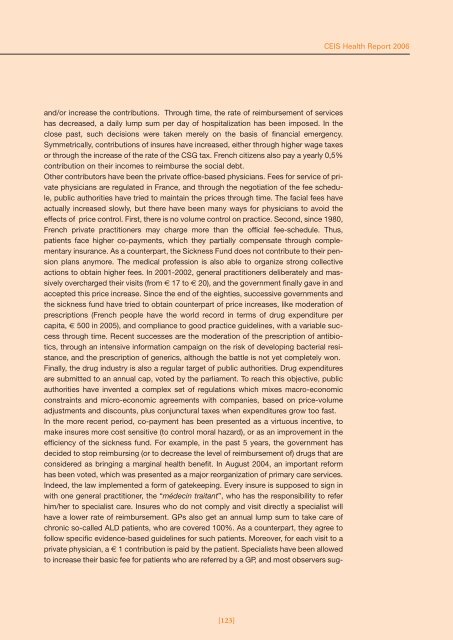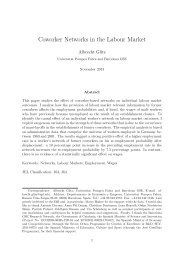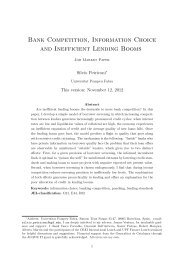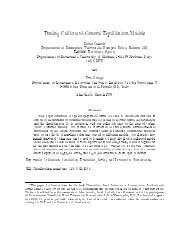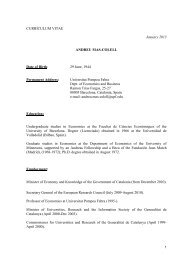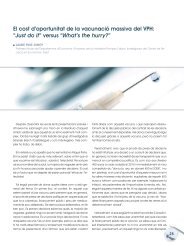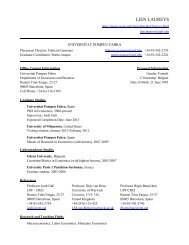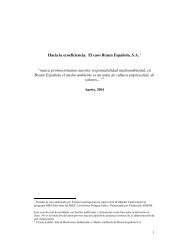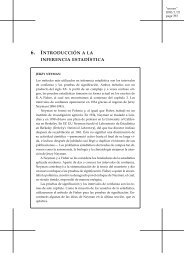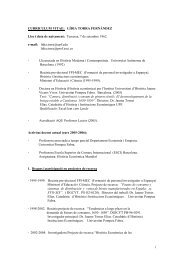Chapter 2
Chapter 2
Chapter 2
Create successful ePaper yourself
Turn your PDF publications into a flip-book with our unique Google optimized e-Paper software.
and/or increase the contributions. Through time, the rate of reimbursement of services<br />
has decreased, a daily lump sum per day of hospitalization has been imposed. In the<br />
close past, such decisions were taken merely on the basis of financial emergency.<br />
Symmetrically, contributions of insures have increased, either through higher wage taxes<br />
or through the increase of the rate of the CSG tax. French citizens also pay a yearly 0,5%<br />
contribution on their incomes to reimburse the social debt.<br />
Other contributors have been the private office-based physicians. Fees for service of private<br />
physicians are regulated in France, and through the negotiation of the fee schedule,<br />
public authorities have tried to maintain the prices through time. The facial fees have<br />
actually increased slowly, but there have been many ways for physicians to avoid the<br />
effects of price control. First, there is no volume control on practice. Second, since 1980,<br />
French private practitioners may charge more than the official fee-schedule. Thus,<br />
patients face higher co-payments, which they partially compensate through complementary<br />
insurance. As a counterpart, the Sickness Fund does not contribute to their pension<br />
plans anymore. The medical profession is also able to organize strong collective<br />
actions to obtain higher fees. In 2001-2002, general practitioners deliberately and massively<br />
overcharged their visits (from € 17 to € 20), and the government finally gave in and<br />
accepted this price increase. Since the end of the eighties, successive governments and<br />
the sickness fund have tried to obtain counterpart of price increases, like moderation of<br />
prescriptions (French people have the world record in terms of drug expenditure per<br />
capita, € 500 in 2005), and compliance to good practice guidelines, with a variable success<br />
through time. Recent successes are the moderation of the prescription of antibiotics,<br />
through an intensive information campaign on the risk of developing bacterial resistance,<br />
and the prescription of generics, although the battle is not yet completely won.<br />
Finally, the drug industry is also a regular target of public authorities. Drug expenditures<br />
are submitted to an annual cap, voted by the parliament. To reach this objective, public<br />
authorities have invented a complex set of regulations which mixes macro-economic<br />
constraints and micro-economic agreements with companies, based on price-volume<br />
adjustments and discounts, plus conjunctural taxes when expenditures grow too fast.<br />
In the more recent period, co-payment has been presented as a virtuous incentive, to<br />
make insures more cost sensitive (to control moral hazard), or as an improvement in the<br />
efficiency of the sickness fund. For example, in the past 5 years, the government has<br />
decided to stop reimbursing (or to decrease the level of reimbursement of) drugs that are<br />
considered as bringing a marginal health benefit. In August 2004, an important reform<br />
has been voted, which was presented as a major reorganization of primary care services.<br />
Indeed, the law implemented a form of gatekeeping. Every insure is supposed to sign in<br />
with one general practitioner, the “médecin traitant”, who has the responsibility to refer<br />
him/her to specialist care. Insures who do not comply and visit directly a specialist will<br />
have a lower rate of reimbursement. GPs also get an annual lump sum to take care of<br />
chronic so-called ALD patients, who are covered 100%. As a counterpart, they agree to<br />
follow specific evidence-based guidelines for such patients. Moreover, for each visit to a<br />
private physician, a € 1 contribution is paid by the patient. Specialists have been allowed<br />
to increase their basic fee for patients who are referred by a GP, and most observers sug-<br />
[123]<br />
CEIS Health Report 2006


